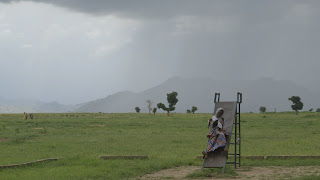Cyrielle Raingou's debut feature The Spectre of Boko Haram (French: Le Spectre de Boko Haram) won the Tiger Award at this year's International Film Festival Rotterdam, and it continues its way around the festival circuit with outings at the BFI London Film Festival, where it screens on Thursday, October 5 and Friday, October 6. Although Raingou's film won the IFFR's flagship prize, it is not in competition at the LFF but rather finds itself in the festival's Journey strand, where it is joined by fellow documentaries The Echo and Ramona. Cameroon native Raingou cut her teeth on short films including The Lamb, Challenge and Requiem Prologue, before moving into long-form filmmaking with her Rotterdam winner, a work which documents daily life in Kolofata, a village in the director's home region.
Kolofata is a northern Cameroonian commune which sits close to the Nigerian border; for many years, the militant Islamist organisation Boko Haram has been based in Nigeria, but their reach extends to neighbouring countries Cameroon, Chad and Niger, as well as the latter's neighbour, Mali. Kolofata has come under attack from Boko Haram on more than one occasion, and judging by the heavily-armed soldiers who guard the perimeter of the village's school, it seems that no one is discounting the possibility of future assaults on the town. The film focuses on three children—Falta, Mohamed and Ibrahim—as they go about their everyday activities in the face of the fallout from Boko Haram's actions; Falta's father was killed by a suicide bomber, while Nigerian brothers Mohamed and Ibrahim are separated from their parents.
Given both its success at Rotterdam and the subject matter, The Spectre of Boko Haram is an unexpectedly muted film; while it's an assured, fitfully engaging documentary, the style is televisual, and the filmmaking rarely rises to anything beyond workmanlike. It's a sober, low-key work, one in which Cyrielle Raingou is bent on showing the lasting effects of conflict, while the violence itself is all but sidelined. In accord with the film's baldly descriptive title, Boko Haram is an undeniable, unsettling presence here: never at the forefront of proceedings, but always lurking around the margins of the quotidian. Moreover, Raingou provides virtually no context or background on Boko Haram's activities, which underlines her steadfast dedication to prioritising victims over perpetrators.
Sticking with Francophone cinema, and Canadian short Making Babies (French: Faire un enfant) screens today as one of half a dozen films included in the LFF's What Makes Us programme. Making Babies is written and directed by Eric K. Boulianne, a prolific screenwriter who is perhaps best known for co-writing Michel Côté-starrer De père en flic 2. Here, Boulianne himself stars alongside Florence Blain Mbaye, with the pair playing a nameless couple who, as per the title, are making an effort to get pregnant. After numerous tries—an on-screen counter keeps track of the attempts—and no progress, the stressed-out couple opts for fertility treatment, which brings no change in fortune but does put even more strain on the relationship. This funny, moving and well-judged film proves just long enough to make its emotional point, with Boulianne turning in great work on both sides of the camera.





